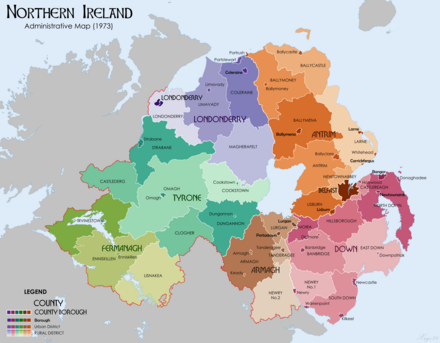1924 Northern Ireland local elections
| |||||||||||||
All council seats | |||||||||||||
|---|---|---|---|---|---|---|---|---|---|---|---|---|---|
| |||||||||||||
The 1924 Northern Irish local elections were held in January & June 1924 for the various county & district councils of Northern Ireland. The election followed changes by the Unionist government, which had redrawn electoral districts, abolished PR for local elections, and implemented a requirement for members of local authorities to take an oath of allegiance.[1]
In protest against these changes nationalists largely boycotted the election, resulting in them losing control of all of the councils they had gained in the 1920 Irish local elections.[1]
Background
The elections were the first local elections to be held in Northern Ireland, which had been created by the Government of Ireland Act 1920. Northern Irelands' county & district councils had last been elected in the all-Ireland 1920 Irish local elections using the Single transferable vote voting system, which had been introduced in the hopes of preventing Sinn Féin from winning the same kind of landslide that the FPTP ward system had allowed it in the 1918 general election.
Whilst Unionists in Southern Ireland had supported the introduction of STV for local elections, Ulsters Unionists had opposed it, with the UUPs' leader James Craig favouring retention of the FPTP ward system used in the rest of Britain, and the UUP was committed to returning to the old system. In contrast, Nationalists favoured the retention of a proportional representation based system as a safeguard for minorities.
The Northern Irish parliament, dominated by the UUP who held 75% of the seats following the 1921 election, legislated for a return to the old FPTP system in 1922,[2] and also legislated for the redrawing of electoral divisions.
Results

As a result of the nationalist boycott Unionists regained control of the county councils for Fermanagh and Tyrone, with no contests taking place in either county.[1]
Unionists also retook 8 rural district councils:
- Cookstown
- Dungannon
- Kilkeel
- Lisnaskea
- Newry No. 1
- Newry No. 2
- Omagh
- Strabane
In Belfast Unionists focused their campaigning on the wards most at risk of falling to the new Northern Irish Labour Party.[1]
Overall the results saw large defeats for Nationalists, Sinn Féin, and Labour candidates. After 1920 these parties had together controlled 24 of the 75 local authorities in Northern Ireland; by 1927 they controlled 12.[1]
Detailed results by council type
County councils

| Authority | UUP | SF | Nat | NILP | Ind | Total | Result | Details | ||||||
|---|---|---|---|---|---|---|---|---|---|---|---|---|---|---|
| Antrim | UUP | Details | ||||||||||||
| Armagh | UUP | Details | ||||||||||||
| Down | UUP | Details | ||||||||||||
| Fermanagh[3] | All | 0 | 0 | 0 | 0 | UUP | Details | |||||||
| Londonderry | UUP | Details | ||||||||||||
| Tyrone[4] | All | 0 | 0 | 0 | 0 | UUP | Details | |||||||
| Totals | ||||||||||||||
County Borough councils
| Authority | UUP | SF | Nat | NILP | Ind | Total | Result | Details | ||||||
|---|---|---|---|---|---|---|---|---|---|---|---|---|---|---|
| Belfast[5] | 12 | 0 | 0 | 2 | 1 | UUP | Details | |||||||
| Derry | No overall control | Details | ||||||||||||
District councils
| Authority | UUP | SF | Nat | NILP | Ind | Total | Result | Details | ||||||
|---|---|---|---|---|---|---|---|---|---|---|---|---|---|---|
| Armagh | Details | |||||||||||||
| Banbridge No.1 | Details | |||||||||||||
| Banbridge No.2 | Details | |||||||||||||
| Castleblayney No.2 | Details | |||||||||||||
| Lurgan No.1 | Details | |||||||||||||
| Lurgan No.2 | Details | |||||||||||||
| Newry No.1 | UUP | Details | ||||||||||||
| Newry No.2 | UUP | Details | ||||||||||||
References
- ^ a b c d e A New History of Ireland Volume VII: Ireland, 1921-84, p.124
- ^ The Northern Ireland Question: Nationalism, Unionism and Partition
- ^ Only Unionist candidates were nominated. "Fermanagh County Council nominations", Irish Times, 23 April 1924
- ^ Only unionist candidates were nominated. "Northern local elections", Irish Times, 29 May 1924
- ^ "Belfast Corporation Elections", Irish Times, 16 January 1924


